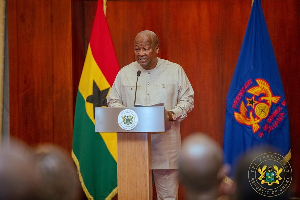 President of Ghana, John Dramani Mahama
President of Ghana, John Dramani Mahama
The newly launched Code of Conduct by President John Dramani Mahama spells out a set of directives meant to foster transparency, sound leadership and accountability for government appointees.
The Code launched on Monday, May 5, 2025, applies to all ministers, deputy ministers, chief executives, and presidential staffers, including the President and Vice-President.
The document, unveiled at Jubilee House, establishes legally binding guidelines that appointees must strictly adhere to.
This write-up seeks to highlight ten (10) important rules that are intended to serve as checks and balances for all government appointees.
It is noteworthy to state that this directive is not novel to the Mahama-led Government, as a similar code was instituted during his tenure in office in 2013.
Here are 10 key directives outlined in the Code:
1. No acceptance of gifts valued over GH¢20,000.00 without declaration
Appointees must not accept gifts or favours from individuals or businesses who have interest in government decisions. Resultantly, gifts exceeding GH¢20,000.00 must be declared and can only be retained with written presidential permission.
2. Strict ban on buying state assets
Political appointees are barred from purchasing government properties—land, buildings, vehicles, or shares—either directly or indirectly. Defaulters of this directive face immediate dismissal.
3. Declare assets or face dismissal
All appointees must declare their assets. Those who took office before March 31, 2025, had until May 7 to comply or risk losing three months salary or even dismissal.
4. No use of public funds for gifts or hampers
The Code prohibits using public funds, including internally generated funds, to purchase hampers or gift items, except modest ones given for staff excellence or retirement, with prior approval.
5. Declare conflicts of interest
Appointees must disclose all business interests, especially those connected to government agencies. They are forbidden from using their positions to benefit relatives or associates.
6. Ban on nepotism and influence peddling
Using influence to secure contracts or appointments for friends or family is not permitted. Even the appearance of bias is grounds for investigation.
7. Mandatory reporting of official travels
All official and unofficial foreign travels require prior approval from the Chief of Staff. Appointees must file a report within 14 days of returning.
8. Sanctions for breach of code
Offenders face penalties ranging from reprimand and suspension to dismissal. The President made it clear that “there will be no sacred cows.”
9. Online reporting system for citizens
A digital portal is being established to allow citizens to confidentially report suspected breaches, ensuring community oversight.
10. Regular briefings and training on ethics
Appointees will undergo periodic ethical training and must sign annual declarations reaffirming their commitment to the Code.
VKB/VPO
Meanwhile, watch as former KATH CEO Professor Otchere Addai-Mensah ‘takes side chicks seriously’
